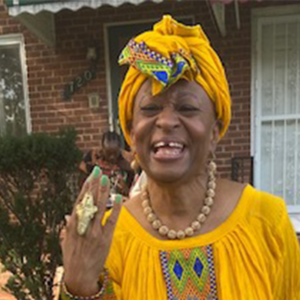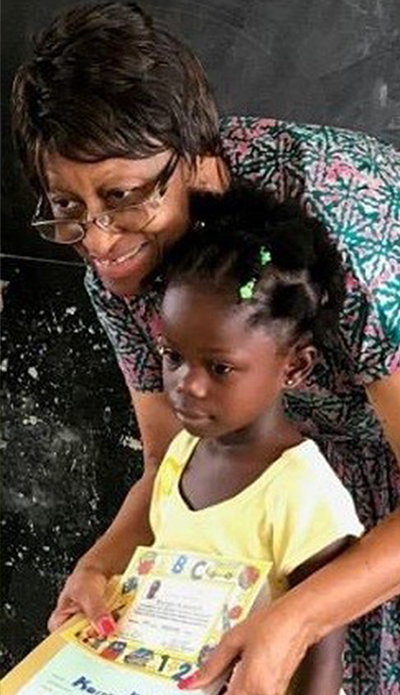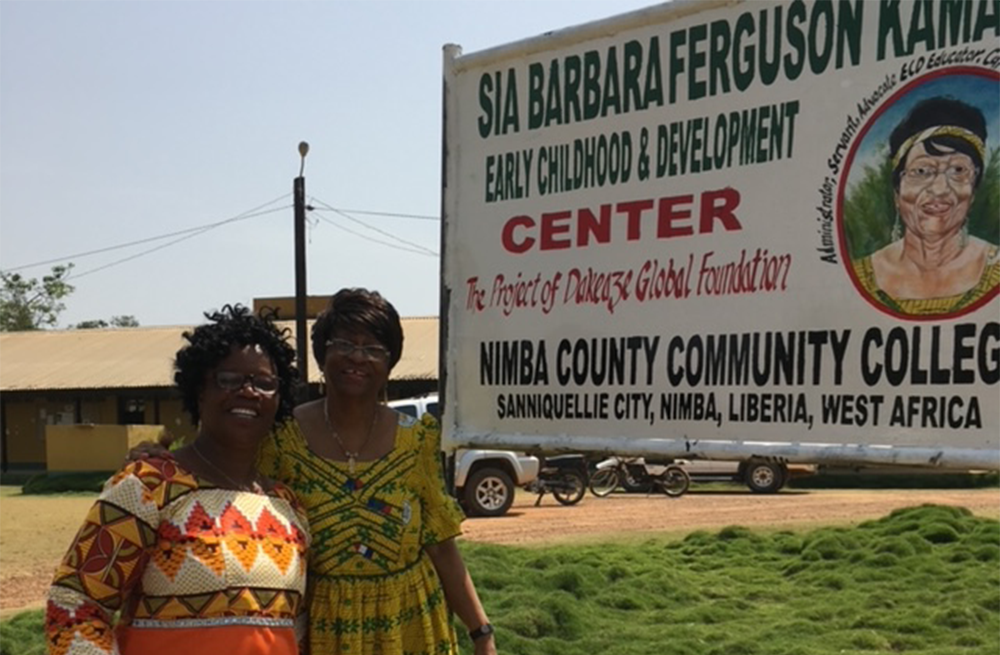 Part of the discussion on “Building a Community of Black RPCVs: Recruitment Challenges and Opportunities”
Part of the discussion on “Building a Community of Black RPCVs: Recruitment Challenges and Opportunities”
Photo courtesy Sia Barbara Kamara
By Sia Barbara Kamara
Peace Corps Volunteer Liberia 1963–65 | Educational Consultant
I live in Washington, D.C. But I grew up in what would be considered public housing in North Carolina. I graduated from Johnson C. Smith University, a historically Black college. The Peace Corps recruiter came to campus just before graduation. I said, Yes, if I can go to Africa. I graduated with a degree in mathematics and physics, and a minor in economics. My goal was to be a scientist.
When I went to Liberia, my parents were very supportive. They always had African students at my college come home and visit. During my time in Peace Corps, when so many African countries obtained independence, every time a country changed its name, they got a new atlas. They sent Ebony magazines to me. I was way up-country, and there were four African American Volunteers in my group; by the time that magazine reached me, it was all dog-eared, because people along the way would read it.
I was a teacher and worked with young women; we created a track team, and they went on to be national champions. As a Volunteer, I had been treated like an African queen; people welcomed the Black American. But they said, “We don’t let foreigners teach below third grade.” That’s when children learn about their own culture, and they learn it from people around them. Eventually they did allow me to do it.

A life of learning: Sia Barbara Kamara with a student in Liberia, where she served with the Peace Corps. She now advises the Ministry of Education of Liberia. Photo courtesy Friends of Liberia
When I returned to the States, I served as a Peace Corps recruiter in the Northeast. Sargent Shriver would have me lead sometimes, because he thought that it was important for people of color to be seen in leadership positions. Then I served on the team recruiting at historically Black colleges. I left to become an intern in a program organized by the wife of a former Peace Corps country director in Nigeria, helping historically Black colleges obtain resources. I wrote grants to expand an early childhood program. I knew little about what I was doing, but Peace Corps gave me the courage to do almost anything. I worked with a superintendent of schools and helped organize a master’s program for African Americans to obtain degrees in early childhood education. I had the opportunity to visit early childhood programs in every Southern state and document what they were doing. I presented a paper and met the president and dean of Bank Street College in New York. They asked, “Where did you get your master’s in early childhood?” I said, “I don’t have one.” They said, “You’re enrolled.”
The president and dean of Bank Street College in New York asked, “Where did you get your master’s in early childhood?” I said, “I don’t have one.” They said, “You’re enrolled.”
I went on to work in North Carolina, responsible for an eight-state Head Start training program. Then I went to work for the governor of North Carolina. President Carter asked me to come work as an associate commissioner in the Department of Health and Human Services, responsible for the national Head Start program, the Appalachian Regional Commission child development programs, childcare regulations, and research and demonstration programs. Then I worked for four mayors in Washington, D.C., to help transform the early childhood system. For the last 10 years, I have been a consultant in early childhood to the Ministry of Education in Liberia. I’ve returned to that place where I got my start, working in Africa.

Early childhood educational center: Sia Barbara Kamara, right, and a sign announcing the work of a center named for her. Photo courtesy Sia Barbara Kamara
When I think about current and returned Volunteers, many need support — networking opportunities, validation, mentoring. It’s important that we continue to provide these during training and reentry, and as people are in service.
People in Liberia have the skill, knowledge, will, and commitment to do for their own country. We can help identify funding opportunities, and be a mentor and coach.
I’m very active in our Friends of Liberia group. However, I’m the only African American in our education work group. We have been able to focus on building human capacity to help groups obtain the resources and background and know-how they need to sustain programs. People there have the skill, knowledge, will, and commitment to do for their own country. We can help identify funding opportunities, and be a mentor and coach.
Going forward, Peace Corps needs to understand what Volunteers are experiencing during training or when they go out. I had spent four years going to jail as part of SNCC, the Student Nonviolent Coordinating Committee. When we were undergoing Peace Corps training in Syracuse, New York, they didn’t want us to go and participate in a march. That was a part of my DNA. It went all the way to Washington for Sargent Shriver to have to make a decision. We marched together.
These remarks were delivered on September 14, 2021, as part of “Strategies for Increasing African American Inclusion in the Peace Corps and International Careers,” a series of conversations hosted by the Constituency for Africa and sponsored by National Peace Corps Association. They appear in the 60th-anniversary edition of WorldView magazine.
Story updated January 17, 2022.
Sia Barbara Ferguson Kamara received the Peace Corps Franklin H. Williams Award for Distinguished Service in 2012. At Head Start, she managed a budget of approximately $1 billion. When she started, there were 100,000 children in the program; it grew to serve 122 million under her watch.